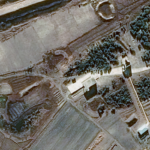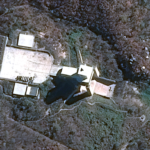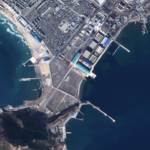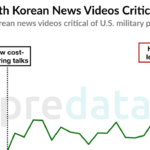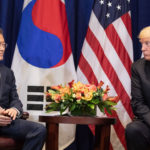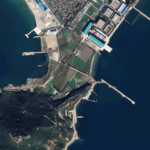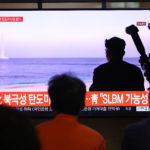December 14, 2019, by Joseph S. Bermudez Jr. and Victor Cha—
The submersible test stand barge located at the Nampo Navy Shipyard on the west coast of North Korea is likely capable of conducting a SLBM test launch at any time... The submersible test stand barge located at the Nampo Navy Shipyard on the west coast…
December 13, 2019, by Joseph S. Bermudez Jr. and Victor Cha—
The Magunpo Solid Rocket Motor Test Facility is located a few kilometers west of the Hamhung-Hungnam area and along the east coast of North Korea. December 6 imagery shows minor activity at the facility, including the presence of a small truck and some crates. Although no recent test appears to have taken place (i.e., absence of scarring in the exhaust deflector and healthy surrounding vegetation), the facility appears to be well-maintained and ready for solid rocket motor testing at any time.
A successful test of solid fuel propellant engine, particularly at the east test stand, would denote another major advancement in survivable nuclear weapons capability, and would presumably also be designed to put additional pressure on the U.S. to make concessions in negotiations.
December 11, 2019, by Joseph S. Bermudez Jr. and Victor Cha—
On December 7, North Korea conducted what it described as a “…very important test at the Sohae Satellite Launching Ground.” Satellite imagery in the days leading up to and after the test clearly shows that this was a rocket engine test at the vertical engine test stand at Sohae. This test was most probably of a liquid-fuel rocket engine as only liquid-fuel rocket engines have previously been tested here, while large solid rocket motors have been tested at the Magunpo Solid Rocket Motor Test Facility on the east coast and elsewhere. Whether the liquid-fuel rocket engine was an existing model or a new one is unknown.
December 4, 2019, by Joseph S. Bermudez Jr. and Victor Cha—
There is no evidence that the “newly built submarine” inspected by Kim Jong-un on July 23, 2019 has been launched. While many media sources have described this new submarine as an imminent threat, it is more accurate to describe it as an emerging threat. The large canopy constructed during late-August and early-September that conceals much of the submarine dock precludes confirmation that the existing SINPO-class experimental ballistic missile submarine (SSBA) is present.
November 26, 2019, by Victor Cha, Eric Falcon and Bryce Pedersen—
Predata signals suggest a significant perception gap emerging between the U.S. and South Korea. First, South Koreans are more focused on the financial burden of the U.S. military presence than on the positive security benefits it provides. Second, U.S. demands for $5 billion in cost-sharing are generating the highest ever levels of social media and video commentary critical of U.S. forces in Korea.
November 22, 2019, by Victor Cha and Richard Armitage—
The 66-year alliance between the United States and the Republic of Korea is in deep trouble. The U.S.-China trade war, the South Korean government’s quiet leaning toward Beijing and President Trump’s transactional view of alliances have created a unique constellation of forces. The result could be a premature withdrawal of U.S. troops from the peninsula at a time when North Korea’s nuclear threat and China’s regional dominance grow unabated.
November 14, 2019, by Joseph S. Bermudez Jr., Victor Cha and Dana Kim—
Recent satellite imagery from November 2019 shows the presence of four specialized railcars that have been associated with the movement of radioactive material in the past. The last observed movement of these railcars by Beyond Parallel was in April 2019. It is unclear whether the railcars are being used for the outbound shipment of irradiated liquid or solid waste, disassembled but contaminated equipment or the movement of fissile material to facilities outside the Yongbyon area. A less likely alternative is the inbound shipment of radioactive material from a facility outside the Yongbyon area.
October 17, 2019, by Joseph S. Bermudez Jr. and Victor Cha—
Analysis of satellite imagery of the Punggye-ri Nuclear Test Facility acquired during 2019 and more specifically on September 23rd and October 9th, 2019 shows the facility in caretaker status, likely being maintained by security personnel. While there is no evidence of current efforts to restore any of the nuclear test portals, several observations lead us to believe the facility has not been permanently disabled and that the detonations in May 2018 are not necessarily irreversible.
October 9, 2019, by Joseph S. Bermudez Jr., Victor Cha and Dana Kim—
The October 2, 2019 Pukguksong-3 submarine-launched ballistic missile (SLBM) test launch has raised concerns over the forthcoming launch of North Korea’s first true ballistic missile submarine (SSB) as described in the Beyond Parallel Snapshot, which was published the same day.
October 2, 2019, by Joseph S. Bermudez Jr., Victor Cha and Dana Kim—
Around 7:11 am on October 2 (KST), North Korea launched what may have been a submarine launched ballistic missile (SLBM) from waters northeast of the Wonsan, Kangwon Province area into the sea between Korea and Japan. The last Beyond Parallel report on the Sinpo South Shipyard indicated the possibility of ongoing preparations for a launch.


